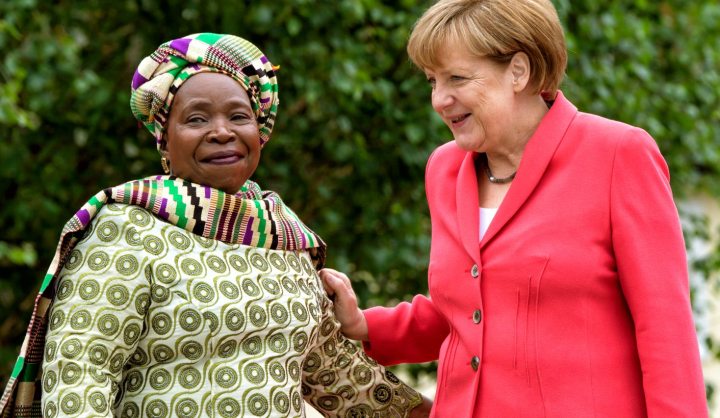World
Analysis: How to Shatter Glass Ceilings

Is there some defining idea that may help explain the success or failure of women aiming at the highest political offices in their respective nations? By J. BROOKS SPECTOR.
The imminent meeting between Donald Trump and Angela Merkel, the public discussion of Nkosazana Dlamini-Zuma’s undeclared candidacy for ANC party president under the banner, “Women Must Lead”, the impeachment and removal from office of now-former South Korean President Park Geung-hye, and, of course, Hillary Clinton’s unsuccessful run for US president a few months back, among others, all provoke contemplation of the challenges of becoming – or staying as – a head of government if one is female. Is there some defining idea that may help explain the success or failure of women aiming at the highest political offices in their respective nations?
Angela Merkel, of course, as chancellor of Germany, is now gearing up to run for yet another five-year term of office. At this point, she is arguably the most successful female politician on the world stage today (unless Marine Le Pen pulls off a stunner of a victory in France). And just as certainly, Merkel is the most adult politician in Europe at present, adopting tough-minded economic policies on European integration, as well as more controversial open door policies towards many of the world’s refugees (although the Greeks certainly have not agreed with the former policies, and Donald Trump is no fan of her choices on the latter issue).
Looking forward to the Tuesday meeting between President Trump and Chancellor Merkel that takes place in the US, the two leaders must find a path to move beyond Trump’s earlier comments that German immigration policy was “insane” – and Merkel’s rather starchy rejoinders to such a critique. Things might be a bit stiff at the beginning.
Then, in their actual Tuesday meeting, the Trumpian song that NATO allies – preeminently rich states like Germany – must pay more of their fair share towards NATO defense costs is sure to come up. Additionally, the US leader will also be extremely critical of the large German trade surplus with the US – some $65 billion or so – although we should not expect any measures to push for voluntary export quotas on Beamers and Mercs, as was the case some years earlier by an earlier Republican administration towards Japanese auto exports to the US. However, there may well be discussions about the possibility of import taxes on luxury German cars made in Mexico and then shipped northward. (Many German cars are also made in plants in America and in South Africa of course.)
Naturally, too, there will be much fine talk about the depth, breadth, strength and vigour of the US-German relationship and the need to improve it in the face of counterpressures – including enticements and pressures from further east. All in all, this first face-to-face meeting will test Merkel’s mettle and maturity in dealing with a mercurial, bombastic US president, but it will give Merkel the chance to polish further her reputation as one of the globe’s preeminent national leaders.
For comparison’s sake, let’s examine a few other examples. Following months of massive demonstrations against her, Park Geun-hye was, until the past weekend, South Korea’s (and East Asia’s) first female president. Impeached and then convicted, Park’s entanglement in a corporate bribery/political favours, influence-peddling scandal proved too much for her to brazen out, and she’s now exiled from the Blue House – and potentially subject to possible criminal prosecution for those deeds. And this has happened despite her being the politically savvy daughter of Park Chung-hee, the longtime authoritarian ruler of their nation, until he was assassinated back in 1979. (In her youth, she had even been the acting first lady for her father when her mother became ill.)
By comparison, Taiwan’s newish president, Tsai Ing-wen, rising up through the ranks of the country’s pro-independence party, the DPP, has managed to to keep a balance between Taiwan’s international freedom of movement within the constraints of most nations’ adherence to the “one China” policy along with the pressures from its giant neighbour across the Taiwan Straits – and to maintain political support from among the island’s voters. And consider, too, the recent political ascent of Yuriko Koike to become governor of Japan’s megacity of Tokyo. If anyone will become Japan’s first female prime minister in our lifetime, it would seem to be a good bet that this chance will be Gov Koike’s to lose.
The experiences and misadventures of Hillary Clinton, of course, also point to the challenges of reaching for the top political brass ring while a family connection looms ever-present in the background. Clinton was ultimately unable to make a convincing case to voters that they should give her the grand prize when she failed to offer a convincing economic vision that touched voters deeply enough, as well as the fact that – fairly or unfairly – she was portrayed as advocating her chance for the presidency because she was the next Clinton, she was an experienced female pol, and that the glass ceiling was now ripe for breaking. Too many – or perhaps just enough – voters seemed to conclude she simply hadn’t done enough in the trenches to convince ordinary voters that they should give her the prize after all. Perhaps if she had started further down the rungs of the political ladder, things might have come out differently. (Or, perhaps, if the Russians hadn’t meddled so assertively, or if the FBI director hadn’t been so eager to show his political rectitude, no matter what….)
Compare Clinton’s fortunes to the political journey of someone like Golda Meir in Israel, from 1948 through to the early ‘70s. Meir had earned her political stripes long before becoming prime minister, as a result of years of work in the fractious world of the Israeli labour movement, service early on as an emissary to the Soviet Union (negotiating military sales), and then in several senior cabinet jobs. Her steadiness under pressure had led the country’s first president, David Ben Gurion, to label her “the best man in the country’s cabinet”. This same kind of slow but steady political progression – and some savvy but stealthy political moves and a set of guiding political precepts – may also have been part of the secrets of success for someone like Margaret Thatcher back then, and now for Theresa May this past year. And maybe such a track record will be Nicola Sturgeon’s too, further north of Westminster, depending on how she handles the Brexit challenge for Scotland.
But, from these disparate examples, are there any lessons that can be learned for the political life of someone like, say, Nkosazana Dlamini-Zuma, here in South Africa, what with her not-so-stealth campaign to become president of the ANC and then the national president, come 2019? Her campaign has been given the signature slogan: “Women must lead” – but this slogan, at least so far, seems to beg the question, without necessarily saying so, of what they must lead or why.
Given the fates of various female politicians who have aimed for the top job through national elections, it seems that they often come to grief – even after winning an election – when they cannot convincingly hold the loyalty of their party amid political and economic adversity, as with Brazil’s Dilma Rouseff, now another former president, following a rancorous impeachment ordeal. Rouseff was an essential part of the administration of her popular, socialist-populist predecessor, Luiz Inácio Lula da Silva, but Rouseff had not convincingly assembled a coalition of support that proved capable of withstanding pressures from within the national legislature, even among her governing coalition.
Thus argument has been made by some observers that successful female heads of government have largely been those individuals who have come up through the ranks of their chosen party – Meir, Thatcher, Tsai, May, and Koike – learning important and necessary political lessons, before taking a gamble to go for the gold, rather than trying to build a victory on someone else’s coat-tails. In that sense, parliamentary systems may give female political challengers more of an edge – especially if building co-operative relations is a real part of the skills set of political women, more so than among men.
True, many male politicians can do that kind of networking too, but electorates seem to judge women more harshly for a start that begins near to the top in their drive for leadership. If this is so, then there may be an early cautionary note for someone like Nkosazana Dlamini-Zuma, who seems bent on arguing – or whose supporters seem to be saying – that she has earned the job while parachuting into it from above. The alternative, arguing that her track record of service in a trio of Cabinet positions and then having been shoehorned into an uneasy chairmanship of the AU Commission, may well give the sense for some that she is riding on another’s coat-tails with the negative connotations that entails.
For those in hereditary monarchies such as England’s Elizabeth I, Ptolemian Egypt’s Cleopatra, Russia’s Catherine the Great, Manchu China’s dowager empress and Palmyra’s Empress Zenobia, coat-tails probably don’t matter much since it was the divine right of rulers and royal heredity that trumped everything else. But in democratic states, building coalitions, gaining painful lessons and experience, developing alliances, and, crucially, demonstrating strength with a velvet glove to mask the iron fist underneath all seem to be critical parts of the successful ruler’s tool kit. And perhaps this will be the case until no one even thinks any more that having two X chromosomes (rather than an X and a Y) is, somehow, a demerit in the political universe. Maybe candidate Dlamini-Zuma will be able to launch an array of exciting, popular and vigorous initiatives and proposals to rescue the nation and that these ideas will ignite national support, in contrast to her putative but conventional opponents. If not, however, she runs the risk of being defined, instead, by her opponents as the candidate who is just still “more of the same” in the current climate, and that this may not be enough. DM
Photo: German Chancellor Angela Merkel greets the chairwoman of the African Union Commission Nkosazana Dlamini-Zuma before the beginning of the outreach conference at Elmau Castle in Elmau, Germany, 08 June 2015. EPA/PETER KNEFFEL



















